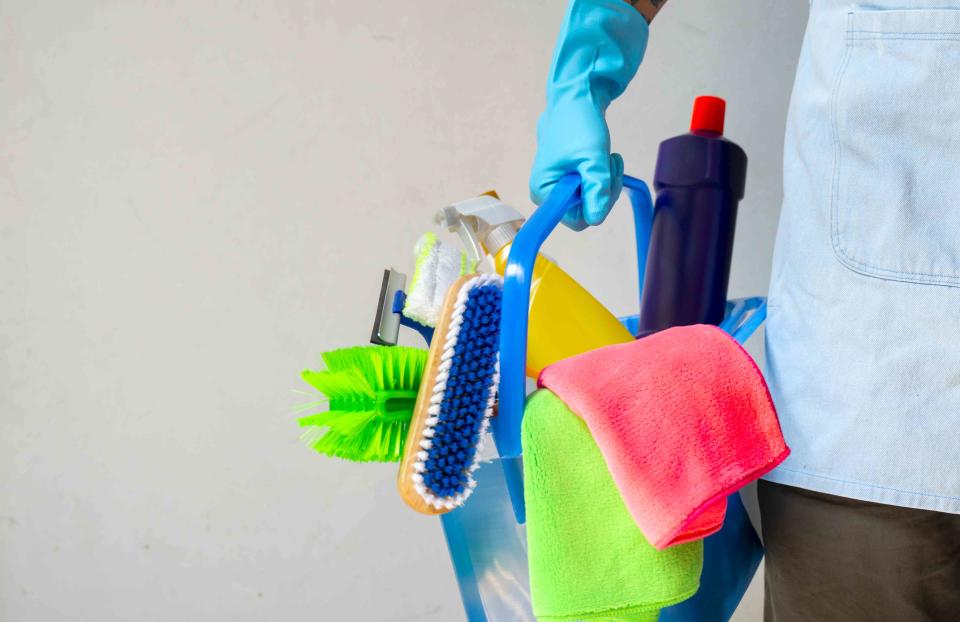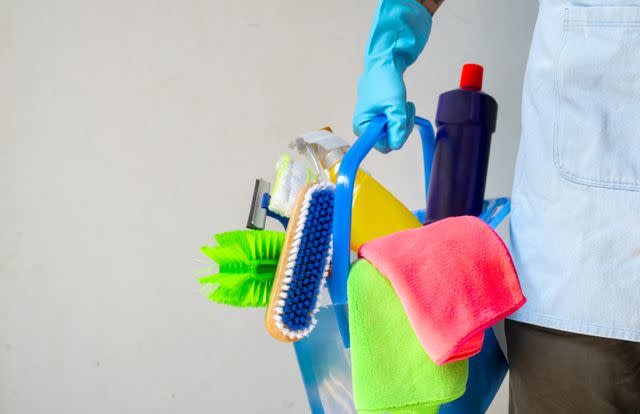Things Professional Cleaners Would Never Buy
Buckle up for a few surprises.

Getty Images
Just like the workout top that we thought would inspire us to get our sweat on, the cleaning gadgets we add to cart and quickly forget about before they even hit our doorstep aren’t all they’re cracked up to be. Many of these new, must-have products pale in comparison to the time-honored ones used by our parents, grandparents, and—you might be surprised to learn—the professional cleaners of today.
“There is always a new and shiny product that promises to work wonders, and some of them work while others disappoint,” says Michael Silva-Nash, VP of Operations of Molly Maid, a Neighborly company. “The truth is, for cleaning, most of the tried and tested products are still reliable and many of the new products aren’t much of an improvement other than a shiny label.”

Getty Images
Meet the Expert
Michael Silva-Nash is the VP of Operations of Molly Maid, a Neighborly company.
Silva-Nash says there are exceptions to this rule thanks to a small number of products that have figured out how to incorporate new innovations that aid in ease-of-use, which is where he really sees the appeal. “Robotic vacuums and mops quickly come to mind as an advancement that works and give you back time,” Silva-Nash shares. As for those fancy cleaners, electronic scrubbers, and the like? They might not stand up to the tried-and-true. Here Silva-Nash shares the top products professional cleaners would never buy.
Disinfecting Wipes
We hate to break it to you, but you’re probably using your disinfecting wipes wrong. Silva-Nash says the direction-readers among us might have noticed that the surface has to stay wet for a number of minutes in order to disinfect properly—which can be difficult to accomplish unless your wipe is thoroughly soaked or you use a few wipes to ensure the surface remains wet. “Soap and water work much better to remove bacteria,” he says. “If you truly need a stronger disinfectant, consider a product you can reuse instead of a disposable wipe.”
Dusters
You know those disposable dusters that are supposedly magnets for the never-ending collection of dust that lives rent free on our bookshelves, tabletops, window ledges, and every horizontal (and somehow even vertical) surface of your home? There not all they’re made out to be. Silva-Nash says they can be wasteful, costly, and borderline ineffective. Instead he recommends stocking up on microfiber cleaning rags, which is what the professionals opt for. “There may be a time and place for other dusting tools, but for 99% of situations, a proper rag will go a long way,” he says.
Glossy Floor Cleaners
Beware of floor cleaners that make promises of extra glow or shine. Silva-Nash warns they aren’t truly cleaners but more of a finishing wax that can actually stand in the way of your floors getting clean in the first place. “Because of the wax, if the floor isn’t properly cleaned before using, it will trap a new layer of dirt, grime, and hair each time you use it, leaving another layer beneath each layer of wax,” he says. Not to mention, removing it will require you to strip the floor. To avoid this scenario, Silva-Nash simply recommends using an appropriate floor cleaner, rather than wax. “If the floor doesn’t have a natural shine, it most likely doesn’t need a glow and if it has lost its glow, hire a professional company to apply the shine and use their instruction to maintain it,” he suggests.
Stainless Steel “Cleaners”
Just like floor waxes, stainless steel “cleaners” aren’t actually cleaners at all, which is why you typically won’t find professional cleaners using them as a first-round product. If you decide to use a stainless steel cleaner, first make sure you have thoroughly cleaned the surface and it’s completely free of food and grime. From there you can apply the shine, but be aware that you’ll probably need much less than you think. “Continue to properly spread the already applied shine instead of spraying more on that fridge front,” advises Silva-Nash.
Window Cleaner with Ammonia
A window cleaner with ammonia is a potentially dangerous component in your cleaning kit for fear it might mix and mingle with any other household cleaners or chemicals. “Be careful with cleaners that mix in other products for ‘effectiveness,’” says Silva-Nash. “Bleach with ammonia is harmful and toxic but given that the ammonia is mixed in with the glass cleaner, you may not think twice and end up with a toxic combo.” Instead you can opt for a glass cleaner that doesn’t use ammonia—or just make sure no one in your household tries to get crafty with your ammonia glass cleaner.
For more Southern Living news, make sure to sign up for our newsletter!
Read the original article on Southern Living.

